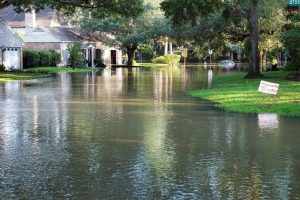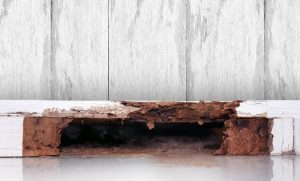10 Things Your Homeowners Insurance Won’t Cover
Protecting your investment in your home with a homeowners insurance policy is one of the most obvious and best financial decisions you can make.
Click here to find the best homeowners insurance policy for you.
Unfortunately, homeowners insurance policies are inherently pretty complicated–all homes are very different, locations vary, and thousands of other factors can affect your policy. This means understanding your coverage is paramount.

And like all insurance, knowing what is not covered is just as important if not more so than knowing what is.
We’ve done more than 1500 hours of research in homeowners insurance, and we think you’d be surprised at what’s hidden in some policies. (For instance, did you know you might be denied coverage because you own a certain breed of dog?)
This is why we always recommend covering your home with a policy from one of the 10 Best Home Insurance Companies.
Read on for more on what is and is not covered in a standard homeowners insurance policy. And click here to see the best homeowners insurance policy for you.
10 Things Not Covered By Standard Homeowners Insurance Policies
The major exclusions on a standard homeowner’s insurance policy are earthquakes, or other earth movements, and floods.
Hurricanes are not specifically listed separately as being covered, but most standard policies usually do cover wind damage caused by hurricanes.
#1 – Hurricane Damage
Many of us believe that we’re covered by our home insurance for any damages or losses to our home or property as a result of a disaster especially some of the big ones:
- Hurricanes
- Earthquakes
- Floods
Unfortunately, the opposite is true. Mostly.
Let’s go through it.
First, What are Perils?
Homeowners insurance policies cover a certain number of what they define as “perils.”
Standard policies usually cover the following ones:
- Fires and smoke
- Lightning strikes
- Windstorms and hail
- Explosion
- Vandalism and malicious mischief
- Damage from an aircraft, car or vehicle
- Theft
- Falling objects
- The weight of ice, snow or sleet
- Water damage
As you can see, hurricanes are not specifically defined as a peril on the list.
Damages resulting from a hurricane, therefore, may be covered under the perils of wind or flood.
Hurricane: “Triggers”
Keep in mind that there are specific “triggers” used by insurance companies, that vary by state, which go into effect after the National Weather Service (NWS) officially names a tropical storm, declares a hurricane watch or warning, or reports a change in the level of a hurricane.
Hurricane: Wind
Not all policies cover wind damage or only partially cover it.
While you’re shopping, check to see what each policy has.
If any of the policies do cover wind, then check to see if there is a separate deductible for hurricane-related wind damage.
If there is one, it is most likely much higher than your standard policy’s deductible.
Depending upon where you live, some insurers may allow you to pay a higher premium to lower the hurricane deductible.
But if your property is located in a high-risk hurricane area, you may not be able to lower your deductible at all.
Hurricane: Flood
Standard homeowners insurance policies do not cover flood damage even if the flooding is caused by a hurricane.
#2 – Floods

Depending on the cause of the flood, your standard homeowners insurance policy may or may not cover it.
But overall, most standard policies do not list floods as a covered peril.
Flood Insurance:
You can purchase a stand-alone flood insurance policy from the National Flood Insurance Program administered by FEMA (Federal Emergency Management Agency).
Premium
The average annual premium for flood insurance is about $700.
However, premiums vary depending on the location of your home and property, especially if it’s in a flood-risk area such as a floodplain.
Natural Disasters
Flooding can occur as a result of overflowing or surging water from a river, lake, ocean or as a result of a significant downpour.
Flooding from any natural disaster is not covered under a standard homeowners policy.
Water Back Up
If a flood originated in your home, then the damage caused by the water may be covered under a standard policy.
Here are the three categories of water back up:
- Water Heater Rupture/Burst Pipe: if the damage is caused by a frozen water pipe bursting (inside your home) or your water heater ruptures, most policies will cover this type of water-damage peril. However, the insurance only covers the water damage and not the replacement of the ruptured water heater or burst pipe.
- Sewage Backup: if an outside sewage or drain backs up into your home and causes damage, this is not covered under a standard homeowners insurance policy. You can, however, purchase a sewage or water backup endorsement or rider. The average cost is about $100 but is dependent upon the deductible and how much coverage you need.
- Water Damage (As a Result of Roof Damage): if your home suffers roof damage due to wind or hail or another covered peril, and the rain comes inside your home causing water damage, you are mostly covered under a standard policy for this type of water damage.
As always, we recommend you read the policy carefully as well as speak to an insurance agent who can guide you through this maze of what’s covered and what is not especially if you live in a hurricane-prone area.
#3 – Earthquakes
Earthquakes are classified as a form of an “earth movement” peril.
Landslides, mudslides, and sinkholes are also forms of earth movement.
This type of peril typically isn’t covered under a standard policy.
There is one exception: fire damage.
If a fire is started as a result of an earthquake, your standard policy should cover that.
You can either add-on earthquake coverage to an existing policy or purchase a separate earthquake insurance policy.
Coverage usually includes repairs, personal possessions, and additional living expenses.
It doesn’t cover:
- Fires
- Vehicle damage
- Floods
- Sinkholes
- Damage to exterior masonry
Regardless of what state you reside in, even California or Alaska, earthquake insurance is not required by the state but is highly recommended if you reside in an earthquake-prone state or area.
Read more:
- Top 5 Homeowners Insurance Companies in California
- Does Homeowners Insurance Cover Sinkholes: Everything You Need to Know
Premiums
The average premium for earthquake insurance ranges a great deal: $800 to $5,000 per year.
Deductibles are typically around 15% of the total value of your home and can vary greatly along with premiums by state and insurers.
Mudslides, Landslides, Sinkholes
Sinkholes, landslides, and mudslides are also considered a form of “earth or ground movement” peril and therefore are not covered under a standard policy.
The one exception: fire damage.
Fire is covered under a standard homeowners policy.
In the case of Florida, insurers are required to offer sinkhole or catastrophic ground cover collapse insurance under standard policies; however, it is usually offered as a rider at an additional cost.
#4 – Termites

Termites, as well as other infestations, are typically not covered by a standard homeowners insurance policy, because they are considered to be preventable by the homeowner.
In other words, fixing any damage resulting from termites, or other vermin, is part of the regular maintenance of a home and the responsibility of the homeowner.
#5 – Mold
If mold damage is caused by one of the covered perils under a policy, then it is covered.
If mold is caused by negligence or from a preventable water lead, high humidity, or flooding, then the damage is not covered. (For more information, read our “Does Homeowners Insurance Cover Mold? – Everything You Need to Know“).
#6 – Home Maintenance
General maintenance of your home is your responsibility and is assumed to be so by insurance carriers.
For instance, if your roof is leaking and causes water damage inside your home, and it is found that you were negligent in repairing the roof, the damage is not covered.
However, if termites chew through the electrical wiring in your home and cause a fire, then your standard policy will cover the damage; fire is one of the commonly covered perils.
Read More: Best Homeowners Companies Insurance That Cover Fire Damage
#7 – Cash

That’s right. Let’s say you stash money somewhere in your home—not in a fireproof safe.
Then, say that money is lost in a fire or to theft. Get this: your homeowners insurance policy will only cover up to $200.
That’s it. Unfortunately, cash including paper money is listed under the collections category, which includes coins, medals, and banknotes.
#8 Aggressive Dog Breeds
Did you know that over one third of homeowners insurance claims are related to a dog bite or attack?
Because of the high risk, most insurers will deny you coverage if you own a dog that is listed as an aggressive dog breed.
Breeds considered to be “aggressive” are:
- Akita
- Alaskan Malamute
- Cane Corso
- Chow
- Doberman Pinscher
- German Shepherd
- Great Dane
- Mastiffs
- Pit Bull Terriers
- Presa Canario
- Rottweiler
- Siberian Husky
- Staffordshire Bull Terrier
- Wolf hybrids
#9 – Swimming Pools

Swimming pools should be covered under most policies under “other structures” on your policy.
Coverage should include any damage to the pool caused by one of the covered perils listed in your policy, for up to the limit set for other structures in the policy.
For liability coverage, it is recommended you increase that five-fold to cover accidents or injuries that could occur during the use of the pool.
Additionally, most insurance carriers will not cover and may even deny you coverage if your pool has a diving board or attached slide.
Other Structures can be detached garages, swimming pools, gazebos, fences, or trampolines.
#10 – Trampolines
Kids love trampolines but unfortunately, insurance companies do not, and for good reason.
More than 90,000 emergency room visits last year were due to trampoline-related injuries.
Therefore, trampolines and other playground equipment are not typically covered under standard homeowners insurance policies.
Also, some companies may not renew a policy if you add a trampoline to it.
If you’re thinking of buying a trampoline, we suggest you read the policy carefully or talk to your insurance agent to get specific details. (Fore more information, read our “Does Having a Trampoline Affect Homeowners Insurance?“).
Other Standard Exclusions
Other common exclusions are war, nuclear hazards, government actions.
So many twists and turns. Click here to find the best homeowners insurance policy for you.
We do hope this blog answered some of your questions on what is not covered under a standard homeowners insurance policy.

